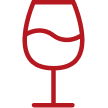2015
The Jiménez-Landi family has been making wine from old Garnacha vines since time immemorial. However, it was in 2004 that Daniel and José, two cousins, started their adventure. They decided to recover the vieilles vignes of their appellation, Méntrida, often planted on slopes and difficult to access, and above all to bring the Garnacha to the top level. Daniel received his training as an oenologist at the University of Madrid in 2005, but according to him mainly because of the many trips and visits he undertook to other wine regions in France and other countries. The many conversations he had with other winemakers from other countries made him realize more and more that he had something unique in his native region. In a few years he learned a lot. His search for Garnacha vineyards, always old and interesting, drove him to other villages of the Sierra de Gredos (this is the mountain massif southwest of Madrid). In 2006 he found here the highest vineyards of the Méntrida appellation in El Real de San Vicente, in the valley of the Tiétar. Here he would create his grand crus: Ataulfos, Cantos del Diable, Fin del Mundo (later changed to The End due to brand name problems). He also found a top vineyard in Avila; in the village of Cebreros he makes the first Reventón with Raúl Pérez in 2007. In 2008, together with his two oenologist friends Marc Isart (Bernabeleva) and Fernando García (bodega Marañones), he founded Comando G, the G of course standing for Garnacha. Together they search for the highest Garnacha vineyards in the Sierra de Gredos, going up to 1000 and 1200 m altitude, both in the D.O. Vinos de Madrid has been in Avila since 2010. The vinification is done only with native yeasts and always with a minimal dose of sulphur. Only large barriques are used from 500 to 1500 liters and never new oak, except in the base wine Bajondillo. Daniel wants above all to produce wines that are balanced, elegant and mineral; that is why there is as little manipulation as possible with the grapes and then with the wines (never pumping). Fermentation in open large French oak barriques, followed by an élevage of 12 to 14 months.







